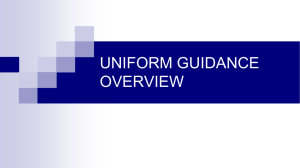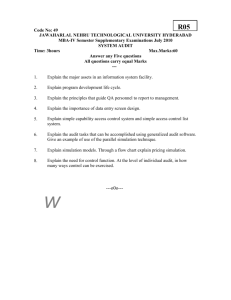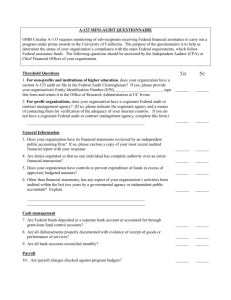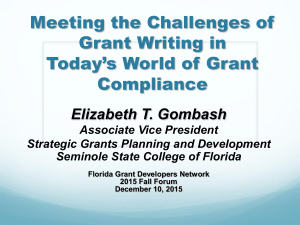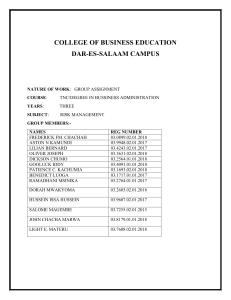Indirect Costs
advertisement
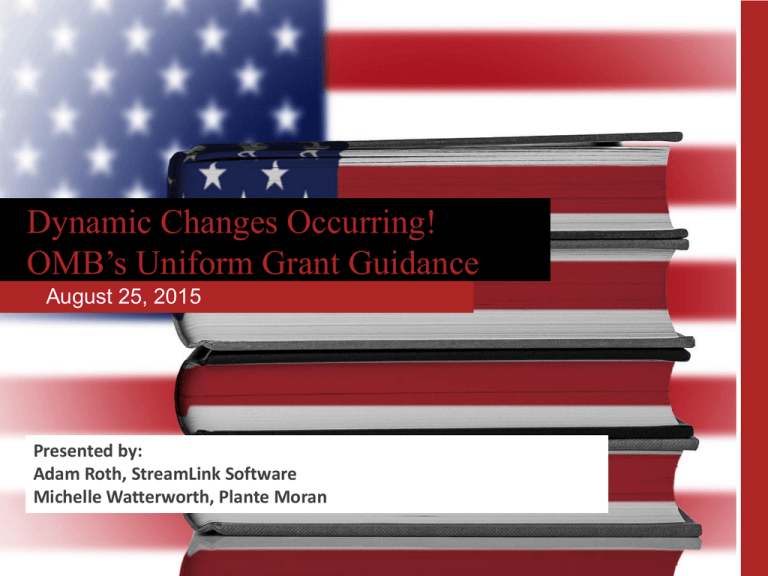
Dynamic Changes Occurring! OMB’s Uniform Grant Guidance August 25, 2015 Presented by: Adam Roth, StreamLink Software Michelle Watterworth, Plante Moran Agenda Uniform Grant Guidance issued 12/26/2013, effective 12/26/2014: 2 CFR Part 200, Uniform Administrative Requirements, Cost Principles, and Audit Requirements for Federal Awards. • • • Cost principles Administrative requirements Audit requirements Brief overview of the changes Discuss Implications and practical approaches • Administrators • Auditors 2 Cost Principles and Administrative Implications of the Uniform Grant Guidance UGG Expands on A-87, A133,etc. Target Areas of Improvement from Previous Requirements • Eliminating duplicative and conflicting guidance • Focusing on performance over compliance for accountability • Encouraging efficient use of information technology and shared services • Providing for consistent and transparent treatment of costs • Limiting allowable costs to make the best use of Federal resources • Setting standard business processes using data definitions • Encouraging non-Federal entities to have family-friendly policies • Strengthening oversight • Targeting audit requirements on risk of waste, fraud, and abuse 4 Cost Principles. Summarized. Where to find them: Then & Now Cost Principles for State, Local, and Indian Tribal Governments Section in Previous Circular A. Purpose and Scope B. Definitions C. Basic Guidelines D. Composition of Cost E. Direct Costs F. Indirect Costs G. Interagency Services H. Required Certifications Attachment A General Principles for Determining Allowable Costs Attachment B Selected Items of Cost Attachment C State/Local Wide Central Service Cost Allocation Plans Attachment D Public Assistance Cost Allocation Plans Attachment E State and Local Indirect Cost Rate Proposals Section in Uniform Grant Guidance Direct and Indirect (F&A) costs Subpart A - Definitions Basic Considerations. 200.402 Composition of Costs 200.413 Direct Costs 200.414 Indirect (F&A) costs 200.417 Interagency Service 200.415 Required Certifications Subpart E - Cost Principles General Provisions for Selected Items of Cost. Appendix V - State/Local Government and Indian Tribe - Wide Central Service Cost Allocation Plans Appendix VI - Public Assistance Cost Allocation Plans Appendix VII - States and Local Government and Indian Tribe Indirect Cost Proposals 6 Accountability of Funds Increase recipient accountability for performance. Required Certifications • Goal is to strengthen awardee accountability by providing explicit and consistent language for required certifications that includes awareness of potential penalties under the False Claims Act. Cost Accounting Standards and Disclosure Statement • Every awardee must meet the threshold in the Federal Acquisition Regulations. • Goal is to strengthen accounting standards, while lowering the risk of noncompliance. 7 Accountability of Funds Time and Effort Reporting Requirements • Strengthens requirements for awardees internal controls over salaries and wages, while allowing flexibility to meet such requirements. • Emphasizes that charges to Federal awards for salaries and wages must be based on records that accurately reflect the work performed. 8 Treatment of Costs Direct Costs • Makes consistent the guidance that administrative costs may be treated as direct costs if the awardee demonstrates that such costs are directly allocable to a Federal award. Indirect Costs • Provides for an indirect cost rate of 10% of modified total direct costs to awardees that have never had a negotiated indirect cost rate. 9 Allowable Costs Acceptable costs based on program performance. Conferences • Clarifies allowable conference spending and requires conference hosts/sponsors to exercise judgment in ensuring that conference costs are appropriate. Idle Facilities and Idle Capacity • Allows for the expense of idle facilities when necessary to meet workload fluctuations of an award. 10 Allowable Costs Contingency Provisions • Provides detailed circumstances under which contingency costs may be included in awards. Travel Costs • Allows temporary dependent care costs that result directly from travel to conferences and that meet specified standards. Indirect Costs Identification and Assignment and Rate Determination for Institutions of Higher Education (IHEs) • Extends to all IHEs provisions allowing for recovery of increased utility costs associated with research. 11 Allowable Costs Interest • Allows awardees to be reimbursed for financing costs associated with patents and computer software capitalized in accordance with GAAP for fiscal years beginning on or after 1/1/2016. Prior Written Approval • Provides a single comprehensive list of circumstances under which awardees must seek prior approval from the Federal awarding agency, the cognizant agency or the pass-through entity. • Examples could include: Travel costs of dependents, Cost of membership in any civic/community organization, Indirect costs related to severance payments, etc. 12 Prohibitions/Limitations Employee Health/Welfare Cost • Eliminates the allowance for “morale” costs. Relocation Costs of Employees • Limits the amount of time for which a Federal award may be charged for the costs of an employee’s vacant former home to six months. Student Activity Costs • Limits for on student activity costs. • For example, costs incurred for intramural activities, student publications, student clubs, and other student activities, are unallowable, unless specifically provided for in the Federal award. 13 Implications to Administrators Identify key performance metrics. • Ensure you are equipped to monitor program performance. • Be able to product standardized reports. Eliminate/mitigate program waste. • Demonstrate change to risky programs. Sub-Recipient Monitoring • Increased performance and cost consistency presents greater pressures on real-time knowledge of subs Negotiate an indirect cost rate. 14 Implications to Administrators Be familiar with the new conference spending guidelines that are applicable to your programs. Understand which contingency costs can be included in awards. • Risky programs are more likely to have unexpected costs. • Know the circumstances under which they can be included as contingencies to protect yourself. Keep track of your certifications to avoid penalties. 15 OMB Circular A-133 Compliance Supplement 2015 OMB has released additional information related to compliance requirements of Federal Departments. The 2015 documentation offers both an in-depth look at each department, as well as a table matrix of Types of Compliance Requirements by CFDA number. Find more information at: http://bit.ly/compliance-supplement For a look at the Matrix of Compliance Requirements, visit: http://bit.ly/compliance-matrix 16 Audit Implications of the Uniform Grant Guidance Audit challenges/implications • • • • • Identifying which rules are applicable Major program determination** Testing compliance requirements (effective now!) Reporting** Other audit-related considerations **These changes not effective until 12/31/2015 year ends 18 Uniform Grant Guidance Effective Dates Federal Agencies By 12/26/2014 Non-federal agencies New awards and funding increments made AFTER 12/26/2014 Audit requirement (Subpart F) start with 12/31/2015 year ends 19 Effective Dates – Incremental funding Funding increments “Where the Federal agency considers funding increments to be an opportunity to modify the terms and conditions of the federal award” (COFAR) Potential issues for auditors and for administrators: • Funding increments received but no modification to terms and conditions were made. Does that mean UGG does not apply? • Fund increments received with no mention by federal agency of UGG applicability. Does that mean UGG does not apply? 20 Effective Dates - Subawards • Subaward effective date for applying UGG is the same as the effective date of the federal award from which the subaward is made • Implications: • Subawards made after 12/26/2014 do not necessarily have to comply with the UGG • To determine effective date for subawards, need to look back to the effective date of the federal award from which the subaward is made 21 Implementation of Effective Dates Possible grantee expenditures under UGG March, June, September 2015 Audit compliance testing under UGG for the first time What is the applicable fiscal year end? December 2015 and after New audit requirements apply (major program and reporting changes) Continued compliance testing under OLD and NEW rules 22 Major program selection (effective starting with 12/31/2015 year ends) Current Rules New Rules • Single audit threshold • $500,000 • $750,000 • Low risk auditee • Unmodified opinion on basic FS in accordance with GAAP • Unmodified SEFA opinion • No material weaknesses at the basic FS level or federal programs • No material non compliance • No questioned costs that exceed 5% • Timely filing with the clearing house • Financial statement opinion could be on the basis of accounting required by state law • Unmodified SEFA opinion • No material weaknesses at the basic FS level or federal programs • No modified opinion on compliance • No questioned costs that exceed 5% • Timely filing with the clearing house • No going concern opinion 23 Major program selection (effective starting with 12/31/2015 year ends) Current Rules New Rules • Coverage requirements • Low risk 25% and no low risk 50% • Low risk 20% and not low risk 40% • Type A threshold • $300,000 • $750,000 • Risk assessment • Sig deficiency OR for Type As (2 material weakness year lookback) • Noncompliance condition reported • Material weakness • Modified opinion • Questioned costs over 5% 24 Compliance testing • Internal control over compliance • Possible changes as a result of implementation of UGG • Allowable costs • Procurement • Subrecipient monitoring • Sampling challenges • Testing major programs with expenditures under both “old” rules and “new” rules • Sampling methodology 25 Compliance testing requirements • 2015 OMB compliance supplement • Part 3.1 – Old rules • Part 3.2 – Under UGG • Removal of 2 compliance requirements • Davis Bacon • Real property and relocation assistance • FFATA testing removed 26 Compliance testing requirements • More significant testing changes under UGG: • Allowable cost/cost principles • Cash Management • Period of Performance (fka Period of Availability) • Procurement and Suspension and Debarment • Subrecipient Monitoring 27 Allowable costs • Changes in allowable costs due to moving from the various cost circulars to the UGG • New/revised steps: • De minimis indirect cost rate • Improper payments focus • Time and effort testing 28 Cash Management • Need to understand the payment method or system a non-Federal entity uses • New/revised steps • Program income • Unearned revenue • Written procedures to implement 200.305 29 Period of Performance • Previously called “Period of Availability” • Focused steps depending upon when performance period begins • Beings during audit period • Ends during audit period • Deleted statement about testing period of performance with the same samples used to test allowable cost/cost principles! 30 Procurement and S&D • New/revised steps • Geographical preferences • Other changes 31 Subrecipient Monitoring • Audit steps more focused • Gain understanding • Compliance focus: • Subaward documents • Monitoring • Required audits obtained 32 Audit reporting** Current Rules New Rules • Question costs reporting threshold • $10,0000 • $25,0000 • SEFA • Subrecipient awards are • Report subrecipient NOT required to be awards by grant on the reported on the FACE of FACE of the SEFA (totals the SEFA. Typically by grant) and no longer reported in the in the footnotes footnotes. **Not effective until 12/31/2015 year ends 33 Audit reporting** Current Rules New Rules • SSPAF/ • Required ONLY for Corrective action SECTION III findings plan • Required for both SECTION II and SECTION III findings • Audit due dates • Extensions allowed • Extensions NO LONGER allowed **Not effective until 12/31/2015 year ends 34 Other audit-related considerations • May need to update testing templates for UGG and nonUGG transactions • Auditees may not have been as proactive as necessary • Possible additional testing issues • Possible additional findings • Federal quality study every 6 years beginning 2018 • Results of reviews must be made public • Auditor focus on now to ensure audit quality 35 Contact Information Adam Roth, Founder and CEO StreamLink Software 216.377.5555 aroth@streamlinksoftware.com Michelle Watterworth, CPA Partner Plante Moran 248.223.3520 Michelle.Watterworth@plantemoran.com 36

